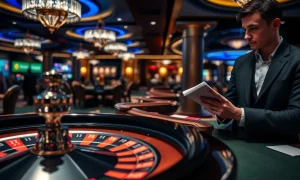As the Powerball jackpot approaches an astonishing $1 billion, millions of Americans are experiencing lottery fever. However, one former addict who lost nearly $1 million has an urgent warning for potential players. His story serves as a crucial cautionary tale about the dangers of gambling addiction.
The Rising Powerball Jackpot Phenomenon
The current Powerball jackpot has captured national attention. Consequently, ticket sales have surged dramatically. Many players dream of instant wealth. However, experts warn about the psychological impact of massive jackpots. The Powerball jackpot creates excitement but also triggers risky behavior.
A Costly Addiction Story
John Miller (name changed for privacy) spent twenty years chasing lottery wins. He ultimately lost approximately $1 million. His addiction began with small purchases. Eventually, it consumed his finances and relationships. Miller now shares his painful experience to help others.
Understanding Powerball Jackpot Odds
Many players misunderstand their actual chances of winning. Consider these critical facts:
- Extremely low probability – 1 in 292.2 million odds
- Better alternatives – You’re more likely to experience other rare events
- Mathematical reality – The house always maintains advantage
- Financial perspective – Small regular investments outperform lottery spending
Warning Signs of Lottery Addiction
Miller identifies several red flags that indicate problematic behavior. These signs often develop gradually. Players should monitor their spending habits carefully. Additionally, family members should watch for behavioral changes. Early recognition prevents severe financial damage.
Responsible Gaming Strategies
Experts recommend specific approaches for lottery participation. First, establish a strict budget for entertainment spending. Second, view tickets as entertainment rather than investments. Third, avoid chasing losses with additional purchases. Finally, seek help immediately if control becomes difficult.
The Reality Behind Powerball Jackpot Dreams
Massive jackpots create widespread excitement. However, they also distort financial perspectives. Many players overlook the practical aspects of winning. Tax implications, management challenges, and personal safety concerns often remain unconsidered. The Powerball jackpot fantasy rarely matches reality.
Resources for Problem Gambling
Several organizations provide support for gambling addiction. The National Council on Problem Gambling offers confidential help. State-run hotlines provide immediate assistance. Financial counselors specialize in recovery planning. Support groups create community among recovering addicts.
Frequently Asked Questions
What are the actual odds of winning the Powerball jackpot?
The odds stand at 1 in 292,201,338. This means you’re more likely to experience numerous other rare events than win the top prize.
How can I recognize lottery addiction in myself or others?
Key signs include spending beyond means, hiding purchases, borrowing money for tickets, and neglecting responsibilities due to lottery activities.
What percentage of lottery revenue goes to prizes versus state programs?
Typically, about 50-60% goes to prizes, 30-40% to state programs, and 5-10% covers retailer commissions and operational costs.
Are there strategies to improve lottery chances?
No. Each ticket has equal probability regardless of numbers chosen. Quick picks and personal numbers have identical mathematical odds.
What should I do if I suspect a gambling problem?
Contact the National Problem Gambling Helpline at 1-800-522-4700 for confidential support and resources immediately.
How do massive jackpots affect gambling addiction rates?
Research shows that enormous jackpots correlate with increased calls to gambling helplines and higher participation among problem gamblers.






